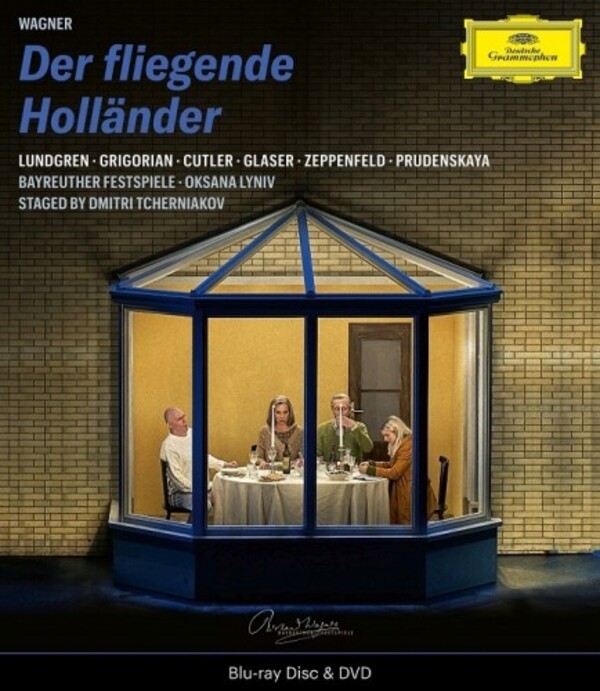WAGNER Der fliegende Holländer (Lyniv)
View record and artist detailsRecord and Artist Details
Genre:
Opera
Label: Deutsche Grammophon
Magazine Review Date: 09/2022
Media Format: Digital Versatile Disc
Media Runtime: 148
Mastering:
DDD
Catalogue Number: 073 6174

Tracks:
| Composition | Artist Credit |
|---|---|
| (Der) Fliegende Holländer, '(The) Flying Dutchman' |
Richard Wagner, Composer
Asmik Grigorian, Senta, Soprano Attilio Glaser, Steersman, Tenor Bayreuth Festival Chorus Bayreuth Festival Orchestra Eric Cutler, Erik, Tenor Georg Zeppenfeld, Daland, Bass John Lundgren, Holländer, Bass-baritone Marina Prudenskaya, Mary, Mezzo soprano Oksana Lyniv, Conductor |
Author: Mike Ashman
It’s a sure-fire bet that, in our age of ‘deconstructed’ stagings, two of the first items to disappear from view will be naturalistic scenery and representations of the supernatural (especially if they were Christian). Russian director Dmitri Tcherniakov’s first work at the Wagner festival here comes alongside other strong local debuts from Ukrainian Oksana Lyniv – Bayreuth’s first-ever woman conductor – and Lithuanian soprano Asmik Grigorian. But there are no signs of the sea, ships or even sailors, even though they’re evoked (and sometimes imagined to be other people on stage) in words and music.
Already noted for his drawing out of alternative narratives for a given work, Tcherniakov presents here a small community in identikit neat modern box houses, much given to celebrating out of doors. Projected text on a front screen advises us that we are watching the belated return home of ‘H’, ie the Holländer, whose mother we see abandoned and driven to suicide during the Overture. (Bayreuth’s patent interval-less single-act version of the score is played, although Wagner never authorised it.) H’s purpose is that of revenge mission, not of seeking salvation from a curse through true love.
In an atmosphere much like a Nordic noir TV whodunit, H inveigles his way into the community with bar-room gifts of tobacco and alcohol and tales of his ill-luck at sea. He then proceeds to disrupt Daland’s family. Grigorian’s quite brilliantly acted Senta is a bolshy, sulky teenager with a streak of red in her blond hair – comparisons have already been drawn with pop singer Billie Eilish – who uses the Holländer’s picture and Ballad to alienate neighbours (at the choir practice that stands in for the Spinning scene), her family and uncoordinated wimpish would-be fiancé Erik. She even laughs off the romantic clichés of the Holländer’s wooing when he’s invited to dine with the Daland family, although later in the action appears persuaded by the idea of a controversial marriage and fights (literally) to try to keep H from leaving.
The ending is bound to be unstraightforward. So, spoiler alert: Frau Mary has been shown as Daland’s wife (ie Senta’s mother or mother-in-law) and very disturbed by (and afraid of) H’s wooing of Senta at the Daland supper. Under evident stress in the final scene, she brings on a rifle and shoots H dead at the point where the score has Senta jumping to death and resurrection. Senta laughs hysterically and, taking the gun from her mother, is left alive to watch her town being burnt down, perhaps by the dark-suited men sitting with H throughout the final scene. (These seem to be identified as ghost crew and use that spooky music to threaten the locals).
This last effect, together with a rather dead patch in the first Senta/Erik scene when, rarely, neither actor is doing too much, is one suggestion that the director’s work on this show’s concept is not yet quite finished. And, at a Festival hampered by Covid precautions – which included the restriction of the singing onstage chorus to about half their actual number (the rest being heard from offstage) – that’s not surprising. But the performance of the major part of it is on a very high level indeed. Lyniv’s conducting is superb in terms of pacing and tonal weight and balance – no Karajan- or Thielemann-like attempts to make this sound a later, weightier and more sophisticated score than it actually is.
The singing cast is almost uniformly excellent. Steersman and Erik have strong, pure voices, and even if Lundgren’s baritone sounds a little worn towards the end, that’s par for this course and no distraction. Grigorian and Zeppenfeld sing as fluently and fearlessly as they act, and Prudenskaya brings much to the extended part of Mary.
Perhaps this shouldn’t be a general recommendation for the opera on small screen, particularly for those new to the work, because there’s rather too much Tcherniakov and maybe not quite enough Wagner. But it’s certainly an inspired and often thrilling journey alongside Wagner’s themes and should appeal especially to those who know the subject matter well and enjoy adventurous theatrical imagery.
Discover the world's largest classical music catalogue with Presto Music.

Gramophone Digital Club
- Digital Edition
- Digital Archive
- Reviews Database
- Full website access
From £8.75 / month
Subscribe
Gramophone Full Club
- Print Edition
- Digital Edition
- Digital Archive
- Reviews Database
- Full website access
From £11.00 / month
Subscribe
If you are a library, university or other organisation that would be interested in an institutional subscription to Gramophone please click here for further information.




